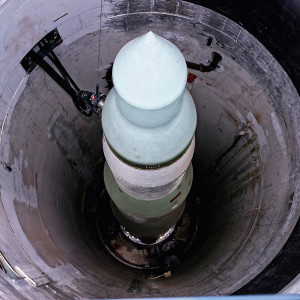National security experts, U.N. officials and even Russian president Vladimir Putin are warning that the prospect of a nuclear war is higher now than it has been in decades.
There are a few reasons for this: increased tensions between the United States and both Russia and China, coupled with dangerous rhetoric about nuclear weapons; longstanding U.S.-Russian arms treaties being discarded; and the development of new types of nuclear weapons that countries might consider more usable in a conflict.
Today, nuclear war could start in multiple ways, including by a deliberate attack or even by mistake. Both the United States and Russia keep weapons on hair-trigger alert and on several occasions have begun preparing to launch based on false warning of an incoming attack.
The destabilizing developments in the world have the likes of the Red Cross calling for a total ban on nuclear weapons, and former U.S. senator Sam Nunn and former U.S. secretary of energy Ernest Moniz urging Congress to get more involved, stating in an op-ed that “the U.S. and Russia are sleepwalking toward a nuclear disaster.”
Members of Congress in both houses have already heeded that call and introduced legislation calling for the United States to adopt a policy stipulating that it will never start a nuclear war by using a nuclear weapon first in a conflict.
Establishing such a policy is one of the most significant steps the United States can take to lower the risk of nuclear war. It would clarify that the only purpose of U.S. nuclear weapons is to deter the use of nuclear weapons against the United States or its allies, or respond to such a use.
Currently, U.S. policy states that it will not use nuclear weapons against countries that do not have nuclear weapons, but it retains the option of using nuclear weapon first in a conflict against nuclear-armed states — essentially just Russia, China and North Korea.
But if the United States used a nuclear weapon first in a crisis — crossing the threshold from conventional to nuclear and starting a nuclear war — that would significantly increase the risk that an adversary would launch a catastrophic nuclear attack on the U.S. public.
A “no first use” policy also would reduce the chance that an adversary would launch a nuclear strike on the United States out of fear that a U.S. nuclear launch against it was imminent.
For these reasons, the policy is supported by numerous military leaders, including Bill Perry, the former secretary of defense, and James Cartwright, the former head of U.S. Strategic Command, the military body responsible for U.S. nuclear weapons.
As they have pointed out, a no-first-use policy would set a global standard for nuclear deterrence and reinforce former President Ronald Reagan’s axiom that “a nuclear war can never be won and should not be fought.”
The electorate is paying attention to this issue, as evidenced by the resolutions that cities, states and even the U.S. Conference of Mayors have passed urging Washington to take specific steps to reduce the risks of a nuclear war, including by adopting a no-first-use policy.
And as the 2020 campaign begins, the public wants the presidential candidates to state their positions on nuclear weapons. A recent poll by the University of New Hampshire Survey Center shows that 84 percent of residents in one of the first primary states, New Hampshire, want the presidential candidates to lay out their views on nuclear weapons.
The poll also found that 73 percent of the state’s residents believe the United States should never use nuclear weapons first in a conflict. This view was shared by well over half, 57 percent, of self-described conservatives. In a slightly older, national poll conducted by Rethink last year, 61 percent of the respondents said there was no situation in which they would want the United States to strike another country that had not used nuclear weapons against us.
The risk of the use of nuclear weapons is one of the greatest threats to humanity. With this threat on the rise, U.S. presidential candidates must make it abundantly clear what they would do, if elected, to help guarantee international peace and security.

